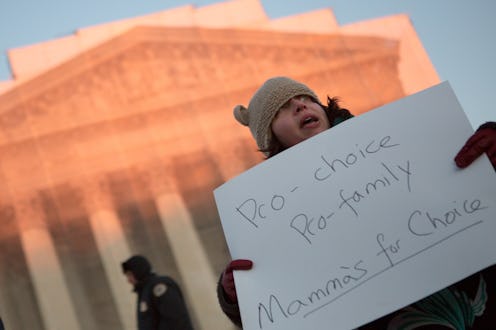News
Reproductive Rights Stories You Missed This Week
As the year winds down, much of the reproductive rights news is already turning to 2016, which is sure to be a major year for abortion rights. During the first quarter of 2016, abortion providers, legal experts, and reproductive health advocates nationwide will be keeping an eye on the Supreme Court, which is taking up its first challenge to abortion in nearly 10 years. But as abortion rights roll back everywhere from Texas to Alabama to North Dakota, new advancements in technology are actually improving access to affordable birth control — the pill on our doorsteps? Yes, please! — giving all of us a slight glimmer of hope for a new future of reproductive equality for all.
Here are the four reproductive rights stories you missed this week...
When Will The Supreme Court Take On Abortion?
One of the biggest cases to hit the Supreme Court in 2016 is Whole Woman’s Health v. Cole, which seeks to finally lay to rest questions of the constitutionality of HB 2, Texas' omnibus anti-abortion law that threatens to shutter almost all of the state's abortion clinics. Under HB 2, abortion providers must obtain admitting privileges at a local hospital, and all abortion clinics must be turned into ambulatory surgical centers — even if the clinic only performs low-risk first-trimester abortions.
Before the Texas state legislature passed HB 2 in July 2013, Texas had more than 40 abortion clinics. If the law is upheld by the Supreme Court, only 10 abortion clinics will remain open in Texas. The admitting privileges provision of the law is already in effect, and is responsible for shuttering more than 20 clinics in the Lone Star State, leaving women outside of the major cities of Dallas, Houston, Austin and San Antonio with no options.
This is the Supreme Court's first major challenge of abortion rights since Gonzales v. Carhart, the 2007 case that upheld the federal Partial Birth-Abortion Ban Act. How the high court rule could impact similar abortion restrictions working to shutter clinics in a number of other states, including Mississippi, where the state's lone abortion clinic remains threatened by an admitting privileges law. On Thursday, the Supreme Court issued the date it'll hear oral arguments in Whole Woman’s Health v. Cole: March 2, 2016.
Meanwhile, A New Abortion Law In Texas
While abortion rights and anti-abortion activists prepare to battle it out at the Supreme Court, a new abortion restriction is slated to take effect in Texas on Jan. 21. This new law increases abortion restrictions for teenage girls who are 17 or younger, making it harder for those without parental consent to obtain a legal abortion.
Under HB 3994, pregnant Texans 17 years of age or younger can only receive an abortion if their physician notifies their parent or legal guardian at least 48 hours before the procedure, there's a medical emergency, or the pregnant patient has a court order (also known as a judicial bypass). Now, that judicial bypass must be issued from the county in which the patient resides, a change in the procedures that is not supported by local reproductive justice groups.
"The survey shows that requiring a teen to file a judicial bypass application in her home county not only jeopardizes her confidentiality, courthouse staff may mislead her to believe that she has no right to seek legal help," Susan Hays, legal adviser for Jane's Due Process, a Texas group that works with minors seeking judicial bypasses for abortion, said in a statement earlier in 2015. "The judicial bypass process is in place as a safety net for abused and neglected teens."
Planned Parenthood Colorado Springs Shooting Trial Moves Forward
At a hearing Wednesday, the man who allegedly opened fire at a Planned Parenthood facility in Colorado Springs on Nov. 27 said he would like to represent himself in court, causing the judge to question his mental competency. Robert Lewis Dear faces nearly 200 counts, ranging from first-degree murder to attempted murder, for killing three people and injuring nine others at the Planned Parenthood Colorado Springs clinic. It's believed that Dear targeted the clinic because of his extreme anti-abortion views; earlier this month, he claimed in court that he was "a warrior for the babies."
Judge Gilbert A. Martinez ordered Dear to a state-directed mental competency evaluation. According to the Associated Press, it may be months before Dear receives the evaluation. The alleged gunman also said at Wednesday's hearing that he did not trust his lawyers. At this time, it's not known if prosecutors will seek the death penalty.
Birth Control At Your Doorstep
This will be your favorite app in 2016: Nurx launched an app that delivers birth control pills, patches and rings to your front door. Seriously. And it's free if you have insurance! (If you don't have insurance, there's a $15 charge.)
Here's how it works: The app features more than 30 contraceptive brands, and will help you choose — virtually — which type of birth control is right for you. If you're already on birth control, the app will provide you with refills, so you don't have to worry about rushing to the pharmacy when you run out at the end of the month. The future is here, and it's awesome.
